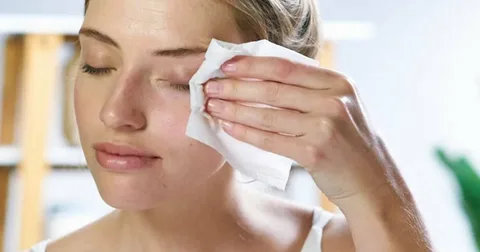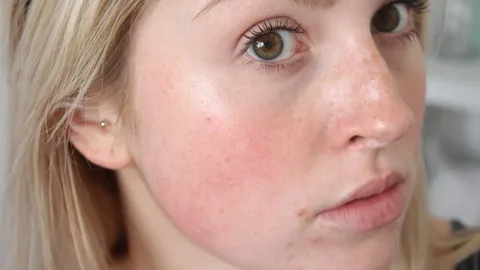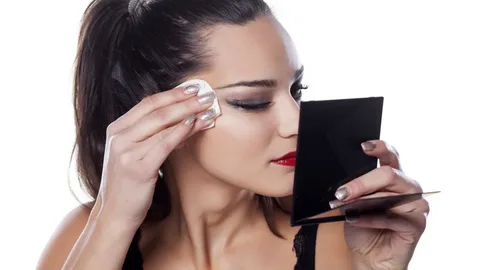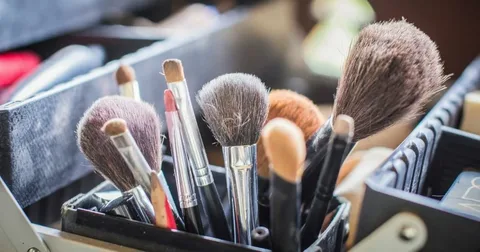Makeup is an essential part of daily life for many people, used not only for beauty enhancement but also for building confidence and self expression. However, the question often arises: can makeup damage your skin?
This question is not only valid but important to consider, given the variety of makeup products available and their ingredients.
The impact makeup has on your skin can vary significantly based on several factors, such as skin type, makeup formulation, and proper removal techniques.
This article will take an in depth look at both the potential benefits and risks makeup can have on your skin. We’ll explore how makeup can damage your skin, when it’s harmful, and how you can continue to enjoy makeup without compromising your skin’s health.
Skin Health Basics: Understanding Your Skin
Before delving into whether makeup can damage your skin, it’s essential to understand how the skin works. The skin is the body’s largest organ and serves as the first line of defense against the outside world.
It keeps harmful microorganisms and environmental pollutants at bay, prevents excessive water loss, and helps regulate body temperature.
The skin is made up of several layers, the most important being the epidermis and the dermis. The epidermis is the outermost layer, responsible for protecting the deeper layers, while the dermis contains collagen and elastin, which provide strength and elasticity.
For healthy, youthful skin, it’s vital to maintain the integrity of the skin barrier, which is designed to keep the skin’s moisture in while blocking harmful substances.
When makeup is applied, it sits on top of the skin, potentially affecting the skin’s natural functions if not handled properly. This is where concerns about makeup’s effects arise, including clogged pores, irritation, and premature aging.
How Makeup Can Damage Your Skin
Though makeup is often seen as a way to enhance beauty, it can also negatively affect skin health in several ways.
Whether it’s due to poor formulation, improper application, or failure to remove makeup correctly, there are risks associated with makeup usage. Let’s explore the main ways makeup could potentially damage your skin.
Clogged Pores and Acne
One of the most significant concerns people have when using makeup is acne. Makeup itself is not the sole cause of acne, but it can certainly contribute to it, especially when makeup products are comedogenic (i.e., pore clogging).
Foundations, concealers, and powders often contain ingredients like mineral oil, lanolin, or sodium chloride, which can block pores and prevent the skin from breathing properly.
When pores are blocked, oil, dirt, and dead skin cells build up inside, which creates an environment where bacteria thrive.
This can lead to inflammation, blackheads, whiteheads, and eventually cystic acne if left untreated. People with oily skin, in particular, may be more prone to breakouts from makeup, as their skin is already producing excess oil.
Tips to Prevent Acne from Makeup:
- Opt for non comedogenic products that are less likely to clog pores.
- Clean your makeup brushes regularly to avoid bacteria buildup.
- Always remove makeup at night to allow your skin to breathe and rejuvenate.
- Choose makeup that is formulated for your skin type, whether it’s oily, dry, or combination.
Skin Irritation and Allergic Reactions
Many makeup products contain fragrances, preservatives, and colorants to enhance their appeal and longevity. However, these chemicals can be irritating to the skin, especially for individuals with sensitive skin.
Fragrances, for instance, are one of the most common allergens in cosmetics, leading to reactions like redness, itchiness, and swelling. Some preservatives, such as parabens, can also cause irritation and allergic reactions in sensitive individuals.
If makeup is left on for long periods, the skin can become dry, inflamed, and even develop conditions like contact dermatitis. Even non allergenic products can cause issues if used frequently or if the skin’s barrier is already compromised.
How to Avoid Skin Irritation:
- Choose products that are hypoallergenic and dermatologist tested.
- Look for makeup that is free from fragrance, especially if you have sensitive skin.
- Always do a patch test on a small area of your skin before applying new products to your face.
Dryness and Dehydration
Some makeup products, especially those designed to give a matte finish, can contribute to skin dryness and dehydration. Many makeup formulas contain alcohols, silicones, and astringents that absorb moisture from the skin, leading to a dry and tight feeling.
Over time, this can leave the skin looking dull and uneven, especially when combined with clogged pores and acne.
Furthermore, if makeup is not removed thoroughly at the end of the day, it can prevent the skin from performing its natural renewal process.
The skin needs to be properly hydrated at night to replenish its moisture levels, and leaving makeup on overnight can disrupt this process.
Tips to Prevent Dehydration:
- Choose makeup products with hydrating ingredients like hyaluronic acid or glycerin.
- Always remove makeup before bed, preferably using a gentle makeup remover or cleansing oil.
- Follow up with a moisturizer to lock in hydration and keep the skin nourished.
Premature Aging (Fine Lines and Wrinkles)
Makeup itself may not directly cause premature aging, but improper use and harsh removal can accelerate the process. Aggressive makeup removal and frequent rubbing can break down the skin’s elasticity over time, causing fine lines and wrinkles to appear.
Additionally, certain makeup formulations especially those with heavy coverage can sit in fine lines and make them more visible, giving the appearance of premature aging.
Long wear formulas that stay on the skin for extended periods can also contribute to aging if they are not removed properly at night.
Free radicals from pollution and sun exposure can build up in the skin and contribute to aging, especially if makeup is left on too long.
Preventing Makeup Induced Aging:
- Always use a gentle makeup remover to avoid damaging the skin while removing makeup.
- Avoid using thick, heavy foundations regularly, opting for lighter, more breathable products.
- Choose makeup with added anti aging ingredients like vitamin C or peptides to promote skin health.
Factors Influencing Makeup’s Impact on Skin Health
The effects makeup has on your skin can vary based on several factors. Understanding your skin type and the makeup products you use can help minimize potential damage and enhance your skin’s overall health.
Skin Type and Makeup
Different skin types respond differently to various makeup products. For example, oily skin tends to produce more oil throughout the day, making it more prone to clogged pores and breakouts when using heavy foundations.
Dry skin, on the other hand, may suffer from dehydration and flakiness when using matte formulas. Sensitive skin can react to certain ingredients, leading to redness, irritation, or allergic reactions.
To prevent makeup from negatively affecting your skin, it’s important to use products that match your skin type:
- Oily Skin: Choose oil free, mattifying foundations and powders.
- Dry Skin: Opt for hydrating foundations that provide moisture and have a dewy finish.
- Sensitive Skin: Use makeup with minimal ingredients and avoid products containing fragrances or harsh chemicals.
The Quality of Makeup Products
Not all makeup products are created equal. Low quality products often contain harsh chemicals, preservatives, and cheap fillers that can irritate or damage your skin. These products can lead to clogged pores, dryness, and long term skin issues.
Investing in high quality makeup products with safe ingredients can protect your skin and ensure that the makeup performs well. Look for products that are dermatologist tested, non comedogenic, and hypoallergenic.
Proper Hygiene and Makeup Removal
One of the most important factors in preventing makeup damage is practicing good hygiene. Dirty makeup brushes, old products, and improper removal techniques can all contribute to skin problems.
Brushes and sponges can accumulate bacteria over time, which can be transferred to the skin and cause breakouts.
Make sure to clean your brushes regularly, avoid sharing makeup with others, and replace old makeup that may have expired.
Tips for Hygiene:
- Clean makeup brushes weekly to avoid bacteria buildup.
- Always replace expired makeup, especially mascara and foundation.
- Use makeup remover wipes or cleansing oils to gently remove makeup before bed.
The Benefits of Makeup for Skin Health
While makeup can have its drawbacks, it can also provide some benefits when used correctly. Here are a few ways makeup can positively impact skin health:
Sun Protection
Many makeup products now contain built in SPF, offering an extra layer of protection against harmful UV rays.
Though makeup with SPF should not replace sunscreen, it can act as an additional barrier against sun exposure, which can contribute to premature aging, sunburn, and skin cancer.
Hydration and Skin Nourishing Ingredients
Several makeup products are formulated with hydrating ingredients like hyaluronic acid, vitamins, and antioxidants that help nourish and protect the skin.
These formulas can help boost skin hydration, promote elasticity, and improve the overall appearance of your complexion.
Confidence Boost
Makeup can provide a significant psychological benefit. Wearing makeup often helps individuals feel more confident and empowered. Research has shown that makeup can positively affect self esteem and even improve social interactions.
How to Minimize Makeup Damage and Maintain Healthy Skin
To continue enjoying makeup without harming your skin, it’s important to follow a few simple yet effective practices. Here are some tips to ensure your skin remains healthy while using makeup:
Always Remove Makeup Before Bed
It’s crucial to remove makeup thoroughly at night. Makeup left on overnight can clog pores, cause irritation, and lead to breakouts. Use a gentle makeup remover and follow up with a moisturizer to replenish lost hydration.
Choose Skin Friendly Products
Look for non comedogenic, hypoallergenic, and dermatologist tested products to reduce the risk of irritation and breakouts. Additionally, opt for products that contain beneficial ingredients like vitamins, antioxidants, and SPF.
Follow a Good Skincare Routine
Makeup should not replace your skincare routine. Always cleanse your skin regularly, exfoliate to remove dead skin cells, and moisturize to keep your skin hydrated and nourished.
By maintaining a healthy skincare routine, your skin will be better equipped to handle the effects of makeup.
Take Breaks from Makeup
If you’re experiencing any irritation or breakouts, give your skin a break from makeup for a few days. This allows your skin to regenerate and recover from any skin damage by makeup.
Conclusion
Makeup can both enhance your beauty and impact your skin’s health, depending on how it’s used.
While there are risks such as clogged pores, irritation, and dryness, these can be minimized by choosing the right products, following proper hygiene practices, and maintaining a consistent skincare routine.
By being mindful of your skin’s needs and the ingredients in your makeup, you can continue to enjoy the benefits of makeup while keeping your skin in top condition.
Remember, can makeup damage your skin? Yes, it can if not used correctly, but with proper care, the damage is preventable.
Frequently Asked Questions
- Can makeup cause acne?
Yes, makeup can clog pores and lead to breakouts, especially if it contains comedogenic ingredients. - How can I avoid skin irritation from makeup?
Choose makeup with minimal fragrances and preservatives, and always patch test new products before full application. - Does makeup cause premature aging?
Makeup itself doesn’t cause aging, but harsh removal and drying formulas can contribute to the development of fine lines. - Is it okay to wear makeup every day?
As long as you properly cleanse and follow a good skincare routine, wearing makeup every day shouldn’t harm your skin. - How do I remove makeup properly?
Use a gentle makeup remover, followed by a moisturizing cleanser to ensure all makeup is removed without stripping your skin.





